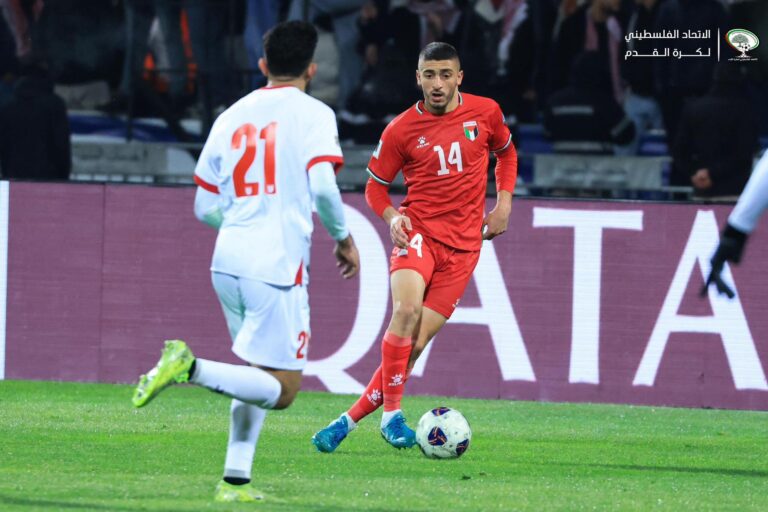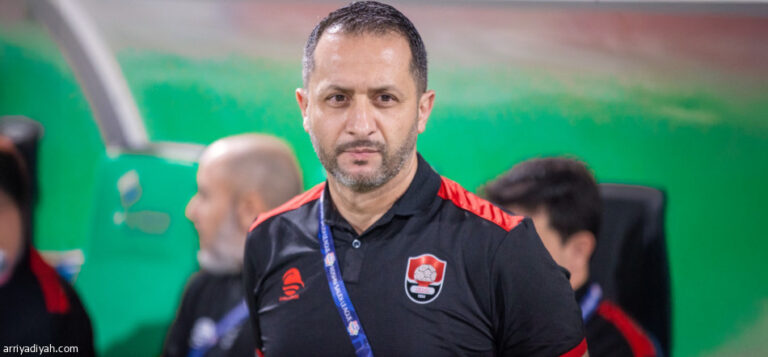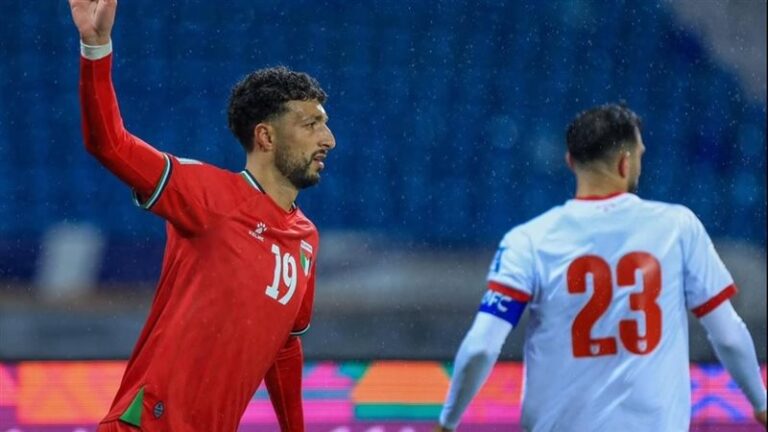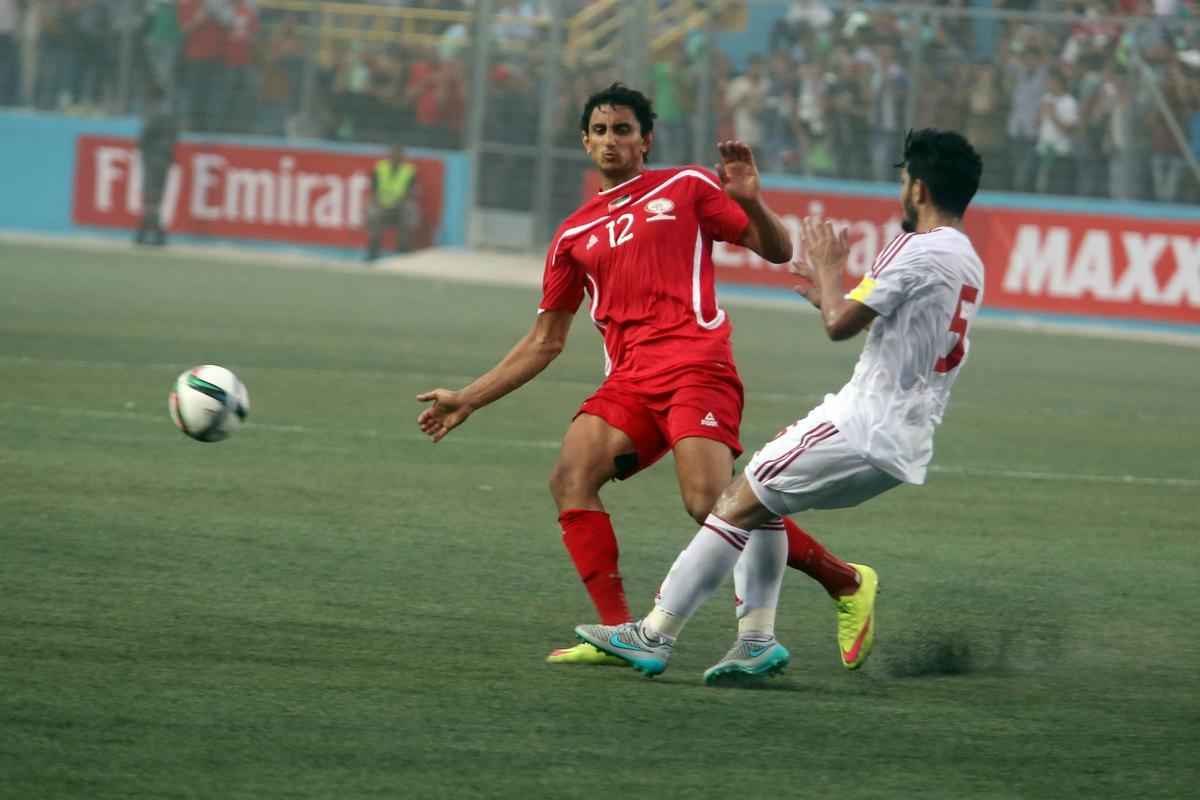 |
| Mahmoud Eid is the only holdover from the 2015 Asian Cup |
Heading into 2017, what does Palestine’s core look like? AND how close are we to fielding a team that can not only qualify for UAE 2019 but do some serious damage?
The answers to these questions aren’t clearer after the last set of friendlies. While it was nice to see two friendlies booked for the same window; certain circles will be lamenting the lack of rotation.
Fans have their opinions and so do we but in this article we’ll look at how the staff rates the players in the pool.
Palestine famously qualified for the 2015 Asian Cup without an out-and-out striker but two years on there are a number of new, talented players in the pool.
Below is the definitive ranking of national team forwards:
1. Yashir Pinto Islame
25 years old, 3 (2)
2. Carlos Salom
29 years old, 1 (1)
3. Mahmoud Eid
23 years old, 12 (1)
4. Ahmed Abu Nahyeh
25 years old 7 (5)
5. Matías Jadue
24 years old, 6 (1)
6. Hamada Mar’aba
22 years old, 0 (0)
7. Rodrigo Gattas
25 years old, 0 (0)
8. Ahmed Maher
25 years old 12 (5)
Let me preface this by saying ranking the forwards in the pool was no easy task. There is a small sample size or a flawed sample size for every player capped in the last two years. When ranking players- especially strikers- you need to take into consideration a variety of factors- including club form.
Palestine is fortunate to have options but sometimes that results in a lack of direction. A national team manager needs to settle on a formation and a group of players. Fostering consistency means fewer mixups on the pitch, which in turn, leads to results.
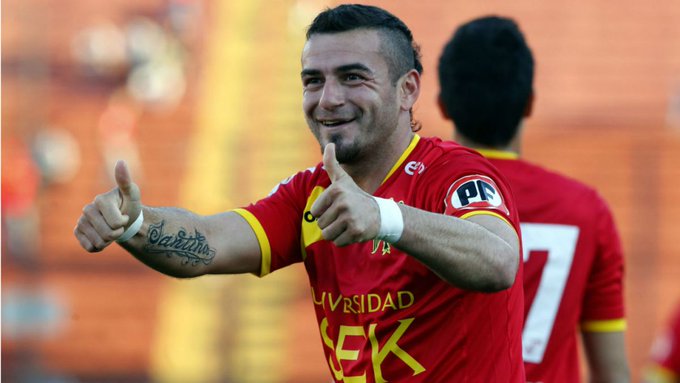 |
| Salom in action for Union Española in Chile |
Carlos Salom may have only played one game for Palestine but he’s been electric during this Chilean Apertura campaign 7 goals in 14 games and another four in five cup matches means he’s averaging a goal every 148 minutes. His work off the ball is equally impressive getting service to the Apertura’s leading scorer Diego Churín.
Salom showcased his ability to terrorize defences against Tajikistan. He was guilty of holding the ball for too long at times but Salom could be the most electric player to wear the Palestine jersey since Ashraf Nu’man.
His understandable refusal to travel to Lebanon from Chile on anything less than a Business Class ticket is understandable. The FA needs to have a policy in place that gives our players the best treatment possible. Expecting a player to be good to go after 20 hours of travel in economy is preposterous.
Fans have been frustrated with Mahmoud Eid’s lack of goals with the national team which is an unfair criticism given the fact that he has been played in games where Palestine had very little attacking intent. Eid scored in his second match against Vietnam but then was fielded in all three Asian Cup matches and two warm up games where Palestine scored a total of one goal. What fans tend to forget is that when Eid isn’t scoring he contributes in other ways.
Eid is a fantastic crosser of the ball his set piece ability led to Ihbeisheh’s goal at the Asian Cup and Palestine’s first 2018 World Cup qualifying goal.
In his one year absence from the team Mahmoud Eid didn’t sulk instead he kept racking up the goals. Earning a move to Atvidaberg in the Superettan where he continued to score (8 goals, 3 assists in 16 matches) and eventually moving to the top tier in midseason with Kalmar FF. In 10 appearances he managed three starts and notched two goals. Those are solid numbers and when the Allsvenskan starts again in March he should be well poised to do even better.
Yashir Pinto Islame has been solid in his three caps. He is yet another player in the side who managed to score on his national team debut and he won a penalty in gritty fashion in the second friendly against Tajikistan. His form over the past year in Chile’s Primera B and Malaysia’s second tier is nothing to scoff at (11 goals for Curicó in 20, four in five for Melaka).
 |
| Jadue scored on his debut but is scoreless in the last five. |
Matías Jadue was the forerunner in making the move to Malaysia’s second tier. His gamble paid off, as he has found a home and was instrumental in PKNS’s promotion and impressive cup runs (a total of 19 goals in all competitions).
It will be interesting to see how they adapt in the Malaysian Super League after leading their respective sides to promotion. Both Yashir and Jadue have been dogged by the reputations of the leagues they play so they’ll need to keep scoring in order to push for starting spots with the national team.
Jadue has been lethal for PKNS in Malaysia and one can only hope that that confidence carries over to the national team.
The only domestically based player to merit starting consideration up top is Ahmad Abu Nahyeh. Abu Nahyeh’s goals have been crucial- he was the inspiration in a 6-0 demolition of Malaysia and before that he kept Palestine’s qualifying hopes alive; coming off the bench to nab an equalizer against Timor Leste.
That said, his form for Shabab Al-Khalil has dipped and he has only scored one league goal since making a big fuss about his wages.
Rodrigo Gattas has been included in the squad since his summer move to Hilal Al-Quds at the expense of his teammate Ahmad Diyab. Gattas has one WBPL goal to Diyab’s five.
Hamada Mar’aba has a good track record of goal scoring have notched 17 WBPL goals last year. He has six to his name already and is on course for his second golden boot in as many years, he could be a player to watch in 2017.
Ahmed Maher has worked hard to earn his way back into the national team. There’s some confusion as to where he should play but he has been an effective striker for a surprising Shabab Al-Dhahrieh side. His five goals has the Oryxes in the thick of the title race and he’ll be hoping for his first call up since June 2015.
ANALYSIS
Palestine have been goal-shy against competent opposition in the Barakat era. Some of that is by design as it was quite clear that Palestine needed to shore up defensively following a disastrous showing at the Asian Cup. Three blowout wins against Timor Leste and Malaysia excepted, Palestine have scored three goals from open play in nine games. Even if you toss in the penalties and free kicks Palestine have only seven goals in nine games.
The challenge going forward is to find the right pairing in attack. Palestine have a litany of options but it’s important to note the differences between them. Matías Jadue is great in the air, and can provide good holdup play but if he’s to play then the 4-4-1-1 will need to be altered to a 4-2-3-1.
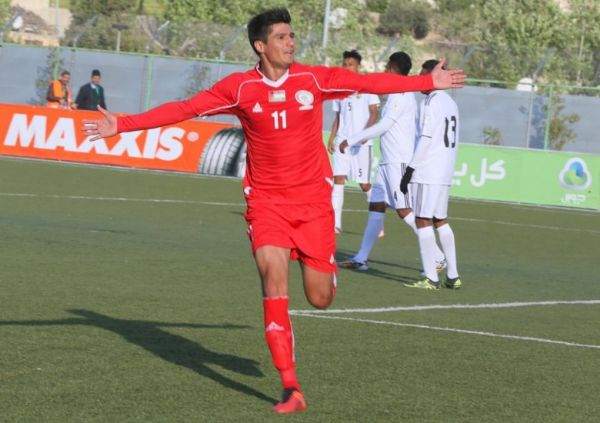 |
| Mini-Pinilla: Yashir in action against Timor-Leste |
There will be pressure on the full-backs and inverted wingers to provide him with service.
Given Palestine’s revolving door at right back that change might never materialize.
The consensus is that Yashir Pinto Islame and Mahmoud Eid are in the same mold as Matías Jadue. This isn’t the case at all- both players are faster and more mobile. Eid’s crossing make him a viable option as an inverted winger in a 4-2-3-1 or 4-3-3 formation.
Islame is particularly adept at making late runs into the box which adds a different dimension to his game. This element means the quick transition game that Barakat implemented whilst in charge of the Olympic side is more viable with Islame than Jadue.
Carlos Salom is a complete departure from the aforementioned forwards as his speed can unsettle and unbalance a defence. That said, to be truly effective he’ll need a partner to play off of. Elements of how effective he could be were on display particularly in the first 20 minutes against Tajikistan.
Ahmad Abu Nahyeh is similar to Carlos Salom but his decision making lets him down. He should have a future with the national team given his five goals in seven appearances. but perhaps he is at his most effective as a super sub running at a tired defence.
The challenge for the coaching staff is to find a style that incorporates the different types of forwards in the pool effectively. It also has to account that it is unlikely all five will be available for any given match. If they are, then three will have to be content with sitting on the bench.
Should Barakat want to build around Salom he’ll have to mend fences immediately. If that’s the case then we will probably see a pairing of Jadue/Islame/Eid & Salom/Abu Nahyeh in the 4-4-1-1.
Things become more complicated in Salom’s absence. As mentioned previously, a WBPL striker with one goal to his name has no business starting for the national team. At the time of writing we don’t quite know how Islame dovetails with Jadue or Eid as they haven’t played together.
Jadue and Eid featured from the start against Malaysia and Timor Leste but to be truly effective they’ll need other pieces to complement them. It will require a player in the hole in the shape of Batran or Awad to control the pace of a slower build up.
Whatever the decision from the staff is, Palestine will need to push further up the pitch against their opponents in Asian Cup qualifying. Palestine has an enviable strike force and no other team in qualifying has two established former Chilean youth internationals, a striker scoring for fun in a top South American league, AND a prodigious talent playing in the top tier in Europe.
It would be all for naught if Palestine continue to play too deep, their center backs aren’t adept at playing the ball out of the back with long range passes and a hoof and hope approach is unlikely to yield many results.






